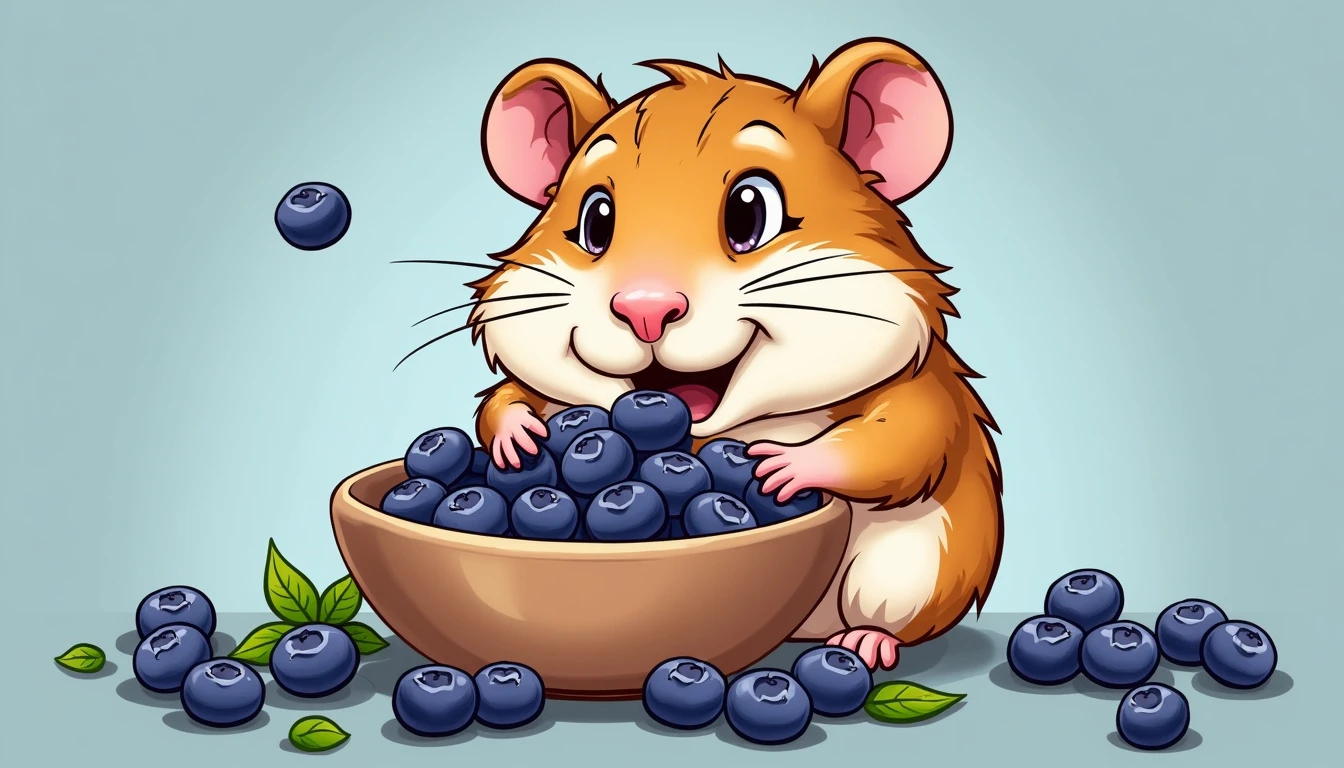As a hamster owner, you want to ensure your furry friend gets the best nutrition possible. While commercial hamster food forms the backbone of their diet, treats like fruits can add variety and extra nutrients. But can hamsters eat blueberries? Let’s dive into this juicy topic and explore everything you need to know about feeding blueberries to your hamster.
Hamster Diet Basics
Essential Components of a Healthy Hamster Diet
A well-balanced hamster diet typically includes:
- Commercial hamster food (70-80% of the diet)
- Fresh vegetables (15-20%)
- Proteins like mealworms or boiled egg (5-10%)
- Occasional fruits and treats (less than 5%)
The Role of Fruits in Hamster Nutrition
Fruits, including blueberries, can be a valuable addition to a hamster’s diet when offered in moderation. They provide vitamins, minerals, and fiber that support overall health. However, it’s essential to remember that fruits should only make up a small portion of their diet due to their high sugar content.
Blueberries and Hamsters: A Nutritional Analysis
Nutritional Value of Blueberries for Hamsters
Blueberries are packed with nutrients that can benefit hamsters:
- Vitamin C: Supports immune function
- Vitamin K: Important for blood clotting
- Manganese: Aids in bone development and metabolism
- Fiber: Promotes digestive health
Antioxidants and Other Beneficial Compounds
Blueberries are famous for their high antioxidant content, particularly flavonoids called anthocyanins. These compounds can help protect cells from damage caused by free radicals, potentially supporting overall health and longevity in hamsters.
Feeding Blueberries to Hamsters: Best Practices
Proper Serving Size for Hamsters
When it comes to feeding blueberries to hamsters, size matters. A safe serving is about the size of your hamster’s paw or half a regular-sized blueberry. This small amount ensures your hamster gets the benefits without overindulging in sugar.
How Often to Offer Blueberries as Treats
Blueberries should be an occasional treat, not a daily staple. Offer them once or twice a week at most, alongside other safe fruits and vegetables.
Preparing Blueberries for Hamster Consumption
- Wash the blueberries thoroughly to remove any pesticides or contaminants.
- Cut the blueberry in half or quarters, depending on your hamster’s size.
- Remove any stems or leaves.
- Offer the blueberry piece at room temperature.
Potential Risks and Considerations
Sugar Content and Obesity Concerns
Blueberries, like all fruits, contain natural sugars. While these aren’t inherently bad, too much sugar can lead to obesity and related health issues in hamsters. This is why portion control is crucial.
Digestive Issues and Diarrhea
Introducing new foods, including blueberries, can sometimes cause digestive upset in hamsters. Start with a tiny amount and monitor your hamster for any signs of diarrhea or changes in behavior.
Allergic Reactions and Individual Sensitivities
While rare, some hamsters may be sensitive or allergic to certain foods. When offering blueberries for the first time, watch for signs of an adverse reaction, such as difficulty breathing, swelling, or lethargy.
Alternatives to Blueberries: Other Hamster-Safe Fruits
If your hamster doesn’t take to blueberries or you want to offer variety, consider these safe fruit options:
- Apple (seeds removed)
- Pear
- Strawberry
- Banana
- Melon
Always introduce new fruits gradually and in small amounts.
Balanced Nutrition for Hamsters
Creating a Well-Rounded Diet for Your Pet Rodent
A balanced hamster diet should primarily consist of high-quality commercial hamster food supplemented with small amounts of fresh vegetables, occasional fruits, and protein sources. This combination ensures your hamster receives all the necessary nutrients for optimal health.
Incorporating Treats Like Blueberries into Overall Nutrition
Treats, including blueberries, should make up no more than 5% of your hamster’s daily food intake. Use these treats as rewards during training or as occasional surprises to enrich your hamster’s diet and life.
Conclusion: Blueberries as Part of a Healthy Hamster Diet
So, can hamsters eat blueberries safely? The answer is yes, but with important caveats. Blueberries can be a nutritious and enjoyable treat for hamsters when offered in moderation. Their high antioxidant content and various vitamins and minerals make them a potentially beneficial addition to your hamster’s diet. However, it’s crucial to remember that blueberries should only be an occasional treat, not a dietary staple.
When feeding blueberries to your hamster, always stick to small portions, introduce them gradually, and monitor your pet for any adverse reactions. By following these guidelines, you can safely incorporate blueberries into your hamster’s diet, providing them with a tasty and nutritious treat that supports their overall health and happiness.
Remember, every hamster is unique, and what works for one may not work for another. Always consult with a veterinarian who specializes in small animals if you have any concerns about your hamster’s diet or health.
FAQ
Can hamsters eat dried blueberries?
It’s best to avoid giving hamsters dried blueberries. The drying process concentrates the sugar content, making them too sweet for hamsters. Stick to fresh blueberries in small amounts.
Are wild blueberries safe for hamsters?
While wild blueberries aren’t inherently unsafe, it’s better to use store-bought blueberries. This ensures they’re free from pesticides, parasites, or other contaminants that wild berries might carry.
What should I do if my hamster eats too many blueberries?
If your hamster overeats blueberries, monitor them closely for signs of digestive upset, such as diarrhea. Provide plenty of fresh water and return to their normal diet. If symptoms persist or worsen, consult a veterinarian.

